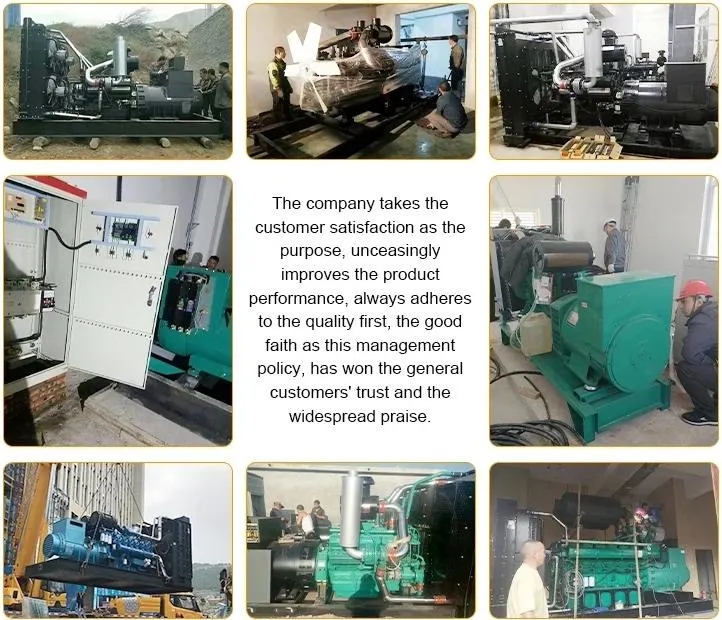The Role of Diesel Generators in Durability Testing A Comprehensive Guide

Introduction
Durability testing is a crucial process in assessing the reliability and longevity of various products, ranging from automobiles to electronics. One essential tool in conducting durability testing is the diesel generator. Diesel generators play a significant role in providing a reliable and consistent power source for testing procedures that simulate real-world conditions. This article aims to explore the importance of diesel generators in durability testing, their key features, benefits, and considerations for optimal performance.
The Significance of Durability Testing
Durability testing is a critical phase in the product development cycle, where products are subjected to rigorous conditions to evaluate their performance and reliability over an extended period. get redirected here helps identify weaknesses, potential failure points, and areas for improvement in a product before it is released to the market. By replicating real-world scenarios and stress conditions, durability testing ensures that products meet or exceed performance expectations and withstand the rigors of everyday use.
Role of Diesel Generators in Durability Testing
Diesel generators are widely used in durability testing due to their reliability, efficiency, and ability to provide a consistent power supply for extended periods. These generators are powered by diesel fuel, which is more energy-dense and cost-effective compared to other fuel sources like gasoline or natural gas. Diesel generators are known for their robust construction, durability, and ability to deliver high power output, making them ideal for powering equipment and systems used in durability testing.

Key Features of Diesel Generators for Durability Testing
1. Robust Construction: Diesel generators are built to withstand harsh operating conditions, making them well-suited for durability testing environments that may involve extreme temperatures, vibrations, and load fluctuations.
2. High Power Output: Diesel generators can deliver high power output, ensuring a reliable and consistent power supply for testing equipment and systems that require significant energy consumption.
3. Fuel Efficiency: Diesel fuel is more energy-dense than gasoline, offering better fuel efficiency and cost-effectiveness over an extended period of use, which is essential for prolonged durability testing.
4. Longevity: Diesel generators are known for their durability and longevity, requiring minimal maintenance and offering a long service life, ensuring uninterrupted power supply during testing procedures.
5. Low Operating Costs: Diesel generators have lower operating costs compared to other power sources, making them a cost-effective solution for durability testing applications that require continuous power supply.
Benefits of Using Diesel Generators in Durability Testing
1. Reliability: Diesel generators are highly reliable and can provide a consistent power supply, ensuring uninterrupted testing procedures and accurate data collection.
2. Versatility: Diesel generators can be used in a wide range of durability testing applications, from automotive testing to electronics testing, due to their high power output and robust performance.
3. Cost-Effectiveness: Diesel generators offer cost-effective operation and maintenance, making them a practical choice for long-term durability testing projects that require reliable power supply.
4. Environmental Considerations: Modern diesel generators are designed to meet stringent environmental regulations and emission standards, ensuring minimal impact on the environment during testing procedures.
5. Remote Testing Capabilities: Diesel generators can be deployed in remote locations or off-grid sites for durability testing, providing a reliable power source where grid power is not available.
Considerations for Optimal Performance of Diesel Generators
1. Regular Maintenance: Proper maintenance is essential for ensuring the optimal performance and longevity of diesel generators. Regular inspections, servicing, and parts replacement will help prevent breakdowns and ensure continuous operation during durability testing.
2. Fuel Quality: The quality of diesel fuel used in generators can impact their performance and efficiency. Using clean, high-quality diesel fuel and following recommended fueling practices will help maintain the generator's efficiency and reliability.
3. Cooling System: Diesel generators produce heat during operation, and proper cooling is essential to prevent overheating and ensure optimal performance. Regular inspection of the cooling system and coolant levels is necessary to prevent downtime and potential damage to the generator.
4. Load Management: Proper load management is crucial for maximizing the efficiency and longevity of diesel generators. Avoiding overloading and ensuring a balanced load distribution will help prevent strain on the generator and optimize its performance during durability testing.
5. Monitoring and Control Systems: Implementing monitoring and control systems for diesel generators can help track performance metrics, detect potential issues, and ensure optimal operation during durability testing. Regular monitoring and troubleshooting will help maintain the generator's efficiency and reliability.
Conclusion
Diesel generators play a vital role in durability testing, providing a reliable and consistent power source for testing procedures that simulate real-world conditions. With their robust construction, high power output, fuel efficiency, and cost-effectiveness, diesel generators are well-suited for a wide range of durability testing applications. By considering key features, benefits, and maintenance practices, organizations can ensure the optimal performance of diesel generators in durability testing, leading to accurate data collection, reliable results, and improved product quality.
